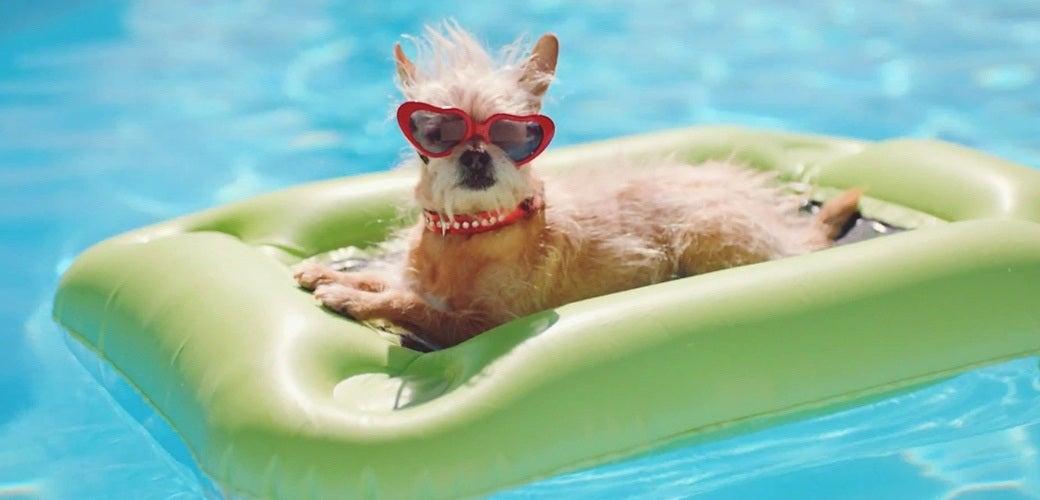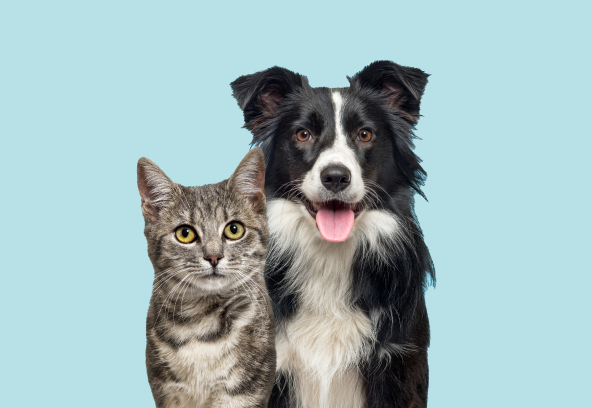
Protect your pet in summer

We all love spending long, sunny days with our furry companions. It makes us all happy! But being over eager in hot conditions can spell danger...
Here's some timely reminders on how you can protect your pet during the warmer months.
Shield delicate skin
Skin cancer is the most common form of cancer in dogs and the second most common in cats.
Although fur provides some protection from the sun, you should apply a pet sunblock every 3 to 4 hours to the least hair-covered spots like bellies on dogs (especially ones who like to lie on their backs) and around the ears and eyes on cats.
Pink skinned dogs and cats are particularly susceptible. There is no need to apply sunscreen directly on fur and make sure you use products made specifically for pets which are readily available through your vet or specialist pet supplies store.
Keep coats long
While it may seem logical to cut your pet's coat short, resist the urge to go for broke and give the equivalent of a number 3! If hair is brushed often, it provides better circulation and helps regulate body temperature.
Walk with caution
Avoid letting your dog linger or walk on hot asphalt or sand or during the hottest parts of the day, usually from 12 to 5. Being closer to the ground (especially the vertically challenged ones), means your pet can heat up quickly and sensitive paw pads and exposed skin on bellies can burn.
In addition, dogs with shorter snouts, such as bulldogs, pugs and boxers can't pant as efficiently in hot, humid weather due to their narrowed nostrils and windpipes.
As a rule of thumb, if you place the back of your hand on the ground for 7 seconds and it becomes too uncomfortable to keep it there, it's too hot for your dog!
Never leave them in the car
Even if windows are cracked, the interior temp can rise quickly. As a guide, if the outside temperature is 24 degrees, the car will be 34 degrees within 10 minutes & 40 degrees within 30 minutes. On a hot day, even a few minutes in the car could cause heat stroke, which can be fatal.
Keep it cool and shady
Remember, if it's too warm for you, it's probably too warm for your pet. That applies to both indoors and outdoors. Plenty of cool, fresh drinking water and shaded relief areas are a must.
Be window smart
Keep windows safe too. During warmer months, our PetnSur team often reports an increase in injured animals as a result of pets, mostly cats, falling out of high windows, balconies & decks. If you have screened windows and doors, great. If not, be vigilant with the higher ones as well as balconies and decks.
Look out for warning signs
In addition to the flat face pets (including cat breeds like Persians), particular care should be taken with older pets, overweight pets and those with heart and lung conditions. If your pet shows signs of heat stress (heavy panting, dry or bright red gums, thick drool, vomiting, bloody diarrhoea or wobbly legs) don't place her in ice cold water, which can put her into shock. Instead, move her to a cool place, drape a damp towel over her body, rewet the cloth frequently, and get her to the vet as soon as you can.
When you are on your way to the vet, take a water bottle with you and keep pouring water over her, wind windows down if moving, switch on air con if in traffic, don't cuddle her (that just makes her hotter), place a pack of frozen peas wrapped in a light towel in the groin or armpit area and ring the vet to let them know you are on the way.
Be water smart
Just like kids, pets should not be left unsupervised around water be that oceans, lakes, rivers or a pool - not all dogs are good at the 'doggy paddle'! And they can often struggle to get out of a pool. Some pets need to get used to the idea of lifejackets so fit them up at home until you know they are comfortable.
Rinsing dogs after swimming is a good idea to remove salt and / or chlorine from fur and try to keep your dog from drinking the pool water to avoid upset tummies.
Be a good host
When entertaining friends and family over summer, remember that sharing may not be caring when it comes to your pets! Unfortunately some of the food and drink that we love may be poisonous to pets. Any change of diet, even for one meal, may give your dog or cat severe digestive ailments.
And keep an eye on charcoal barbies… some dogs love stealing the briquettes off the grill and haring off with them only to find stomach issues ensue - vet treatment for foreign body ingestion is one of the most common (and potentially expensive!) types of claim that we see.
As for fireworks over summer, well enough said really! Guy Fawkes has just passed but it is always surprising how some people still seem to have supplies of them weeks later! And of course, New Years. It's not just the obvious fright they can cause but also the potentially toxic substances they contain if your pet happens to find new or used ones lying around.
Be careful with your green finger
Commonly used rodenticides, lawn and garden insecticides and plant food can be harmful to cats and dogs if ingested, so keep them out of reach. When walking your dog, steer clear of areas that you suspect have been sprayed with insecticides or other chemicals. Keep citronella candles, oil products and insect coils out of pets' reach as well.
We hope some of these tips will help you and your pets stay safe and healthy and enjoy some quality time together over the coming months!

